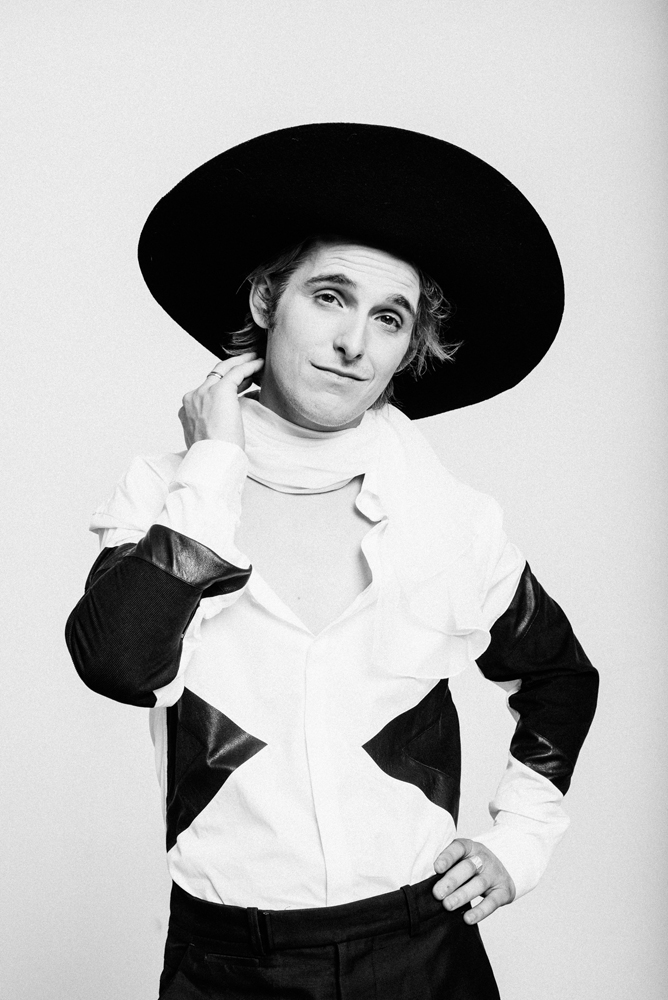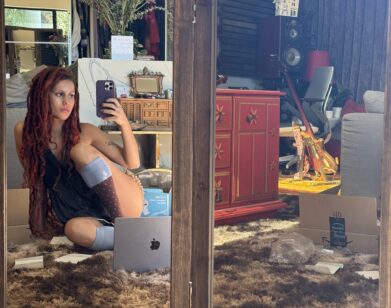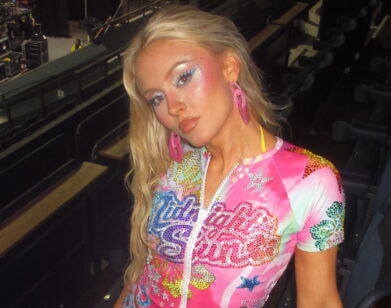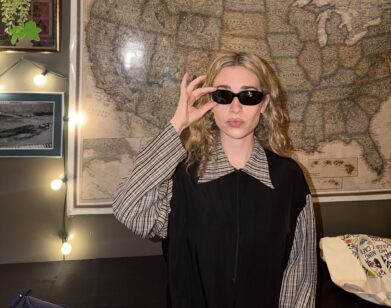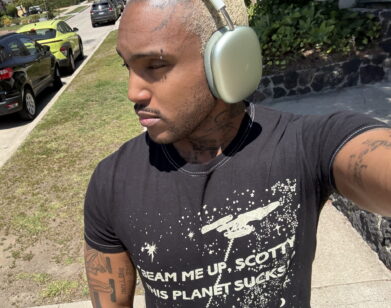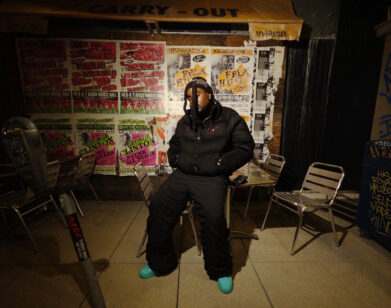Exclusive Track Premiere: ‘Soon To Be, Won’t To Be,’ Diane Coffee
SHAUN FLEMING (DIANE COFFEE) IN LOS ANGELES, AUGUST 2O15. PHOTOS: CARA ROBBINS. STYLING: LISA MADONNA. GROOMING: CHRISTINE NELLI FOR EXCLUSIVE ARTISTS MANAGEMENT USING HARRY’S.
“Who I am on stage is not really a character; it’s something that I’ve always been. I’m just calling that Diane Coffee now,” musician Shaun Fleming explains over the phone. The 28-year-old singer-songwriter first emerged as a drummer for Foxygen before he unexpectedly dropped a solo album, My Friend Fish, under the Coffee moniker in 2013. As an artist who moved from Agoura, a suburb of L.A., to New York, and eventually landed in Bloomington, Indiana (all while touring nationally and exploring Diane Coffee as a side project), Fleming’s unpredictable nature lends some of its erratic qualities to create provocative music. The result is a deep exploration of sonic pleasure, influenced by varying concepts and genres, and Fleming’s constant evolution, made evident on his forthcoming sophomore LP Everybody’s a Good Dog (due out September 4).
The track “Soon To Be, Won’t To Be,” which we’re pleased to premiere below, lacks the full horn section and string ensemble used throughout the rest of the album; instead, the song is purely Fleming, featurng his taunting voice and darkly gripping lyrics, together creating a psychedelic, lo-fi soundscape. In the song, the dualities of morality are explored through Fleming’s investigation of pure loyalty versus less logical, yet indispensable romantic impulses. Before his releases, we spoke with Fleming on dressing as Diane Coffee, escaping New York’s rigor, and following the Bro Code.

MATHIAS ROSENZWEIG: How did you first become involved with Foxygen?
SHAUN FLEMING: I grew up in Agoura Hills, and that’s where I met Sam [France] and [Jonathan] Rado of Foxygen. When they started touring, they needed to put their band together and they asked me. They knew I could play a little bit of drums, not particularly well, but they asked if I could come to a show. One show became two, two became three, and they were like, “Hey, do you want to go on tour?” And then just, “Do you want to just be a drummer now for Foxygen?”
In the middle of one of these tours, I moved in with Rado and Jackie—his girlfriend and one of the dancers now—in New York. While they were visiting California, I had the space to myself for two weeks, and I was just kind of recording, you know, business as usual, like how I’ve always done. When I finished those songs, I felt really good about them, showed them to a few people, Western Vinyl picked it up, and My Friend Fish was born. That’s kind of how Diane Coffee started.
ROSENZWEIG: Tell me about the choice to use a persona for this project. Who is Diane Coffee?
FLEMING: Diane Coffee is just the part of me that has always been a performer. It’s something that’s always been there and Diane Coffee is just the name I’ve given her for this project. But I was always the one who would raid mom’s closet and get all dressed up and put on crazy weird shows in the living room or film little movies. The name kind of came half out of necessity; I needed a name for the project. But I’d been listening to a lot of Diana Ross, so Diane, and then this singer-songwriter Nathan Pelkey, he had a song called “Mr. Coffee,” and I kind of knew I wanted to embody a feminine role for this character.
ROSENZWEIG: What type of themes do you think you focus on in the music? For example, what is “Soon To Be, Won’t To Be” about?
FLEMING: “Soon To Be” is kind of about—you know the “Bro Code”? When you have a friend who dates someone and then you can’t ever date them, no matter what, even when they’re broken up? It’s kind of about the battle of whether or not you are going to break this Bro Code. I hate to say it that way, but it’s like you falling in love with someone that you know has been with someone else that you also care about. Those first lines, “I want to be in love with you,” means sacrificing another love that I have.
ROSENZWEIG: So the song is really about this moral dilemma.
FLEMING: It is. It’s hard. Love is a very intense and strong emotion, and it’ll make you do some weird things. But I’m always for love, and I think when you find something really special, you need to do whatever you have to do to hold onto it. But with all my songs, I try to pull from personal experiences, like moving and changing locations. Now I’m in Bloomington, or when I first moved to New York—that kind of stuff helps spark creativity. It’s mainly these stories and things that I’ve lived through that I end up writing about.
ROSENZWEIG: What brought about your move from one of the world’s biggest cities to Indiana?
FLEMING: It reminded me so much of Agoura. It just has this very small-town feel. Even though Agoura is an hour and change away from L.A., it still feels fairly isolated. It’s very green, some horses, some nice houses and yards, but I didn’t move to be like, “I have to write a new album. I need to get creative.” I just moved there because I didn’t do well with New York. It made me kind of anxious and it was just incredibly expensive. At the time, touring with Foxygen, when you’re on the road for six months of the year and you’re paying New York prices and not even living in your apartment, it just didn’t make any sense. So I had to get out of there. I met my new partner [in Indiana] and she asked if I wanted to move out of New York. I said yeah, and we got a house that’s way cheaper than renting a closet in New York.
ROSENZWEIG: Even if it was unintentional, did moving out of New York affect your music?
FLEMING: You know, it did—it did bring a lot of sunshine to this album. The first one, My Friend Fish, it’s lyrically kind of silly and talking more about leaving Agoura than being in New York, but it’s with some darker melodies and darker tones. On this one, I’m still talking about some heavy issues, but it feels a lot happier to me. Maybe lyrically it’s more reflective of the past few years, being on tour. I think there are a few tracks on there about coming to terms with my lifestyle of being gone—partly as a lover being gone, a partner being gone—and just never having any solid ground, trying to find an anchor of some sort.
ROSENZWEIG: You went from recording your first album partially on an iPhone to working with a bunch of collaborators in a studio. What was the change up like?
FLEMING: We had a really great studio in Bloomington in a graveyard—a really old Midwest graveyard that had super heavy vibes [and was] really beautiful—and we laid down some of the basics there. I had a lot of people, a lot of friends, play on this record. I really wanted this to be my family album; I did the solo, just-play-everything record, so I wanted to reach out and get as many great musicians and friends and people that I knew to put a little bit of their flavor in it.
I had the live, New York-based band from the My Friend Fish tour, and Sam and Rado played on a little bit of it. I had a lot of people from the band I’m playing with in Bloomington now. I even had one of the owners of the Secretly Group, Chris Swanson, on the record. I knew a few people back in L.A. that did string arrangements, so they did string arrangements for that stuff. It’s kind of crazy: It’s not written down anywhere who’s playing what. On some songs, I’ll play four or five things, and then I’ll have three people playing bass on one song—one person will play one section, one plays the chorus, one person plays the bridge, just cramming in a good amount of people.
ROSENZWEIG: “Soon To Be, Won’t To Be” sounds unlike any other song on the album. What’s different about it?
FLEMING: That was actually the first track we recorded. It was an accident. It was me and the engineer; he’s the live sound engineer for Foxygen. So sometimes he’ll come over and bring some mics, we’ll do some just-for-fun recordings, and it’ll be the same way that I wrote My Friend Fish. I’ll just sit down at the drums, make a drum beat, and then lay down bass with the first thing that comes to mind, and then the first guitars that come to mind, first keyboard that comes to mind—you know, just for fun. We did that and “Soon To Be” came to be. We went back into the studio and tried to make it super nice, and it just didn’t have the same vibes as that original demo. So that’s the only song on the record that wasn’t recorded the same way everything else was. I still think it fits, but it’s definitely a weird little piece of that record.
ROSENZWEIG: Do you have anything you’d like to say to someone before they press play on Everybody’s a Good Dog?
FLEMING: I guess I hope you enjoy! I worked hard and hope you like it, but that’s all right if you don’t!
EVERYBODY’S A GOOD DOG WILL BE OUT SEPTEMBER 4 VIA WESTERN VINYL. FOR MORE, VISIT DIANE COFFEE’S FACEBOOK.

